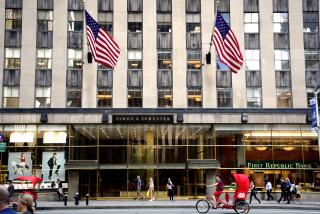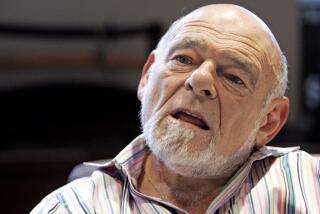The Battle for Harcourt Brace : JOVANOVICH : A Fighter With a Unique Style
NEW YORK — When Warner Communications seemed to be threatening a takeover of publisher Harcourt Brace Jovanovich in 1981, Harcourt Chairman William Jovanovich lost no time telling the world how he viewed the aggressor.
Harcourt could never merge, Jovanovich declared in a prepared statement, with a company that had “origins as operators of parking lots and crematoriums.”
The comment, which referred to two of Warner’s early businesses, said everything about the style of the man who began at Harcourt Brace as a textbook salesman in 1947 and was running the place eight years later. Jovanovich has always spoken his mind--amid a thicket of verbiage--and usually has gotten his way.
As he has done so, 67-year-old Jovanovich has reshaped an old-line publishing concern into a conglomerate with interests from textbooks to amusement parks, insurance companies, broadcasting and real estate.
Jovanovich succeeded in repelling Warner, which sold off a 6.8% Harcourt stake in 1983 after a court battle. But he now faces the most serious threat to his company’s independence: an unsolicited, $44-a-share offer unveiled Monday by British media tycoon Robert Maxwell.
True to form, Jovanovich began by casting aspersions on Maxwell’s origins. “Mr. Maxwell’s dealings since he emerged from the mists of (the Czechoslovakian province) Ruthenia have not always favored shareholders,” Jovanovich said in a prepared statement issued Monday as he rejected the offer.
The takeover battle is shaping up as a clash of monumental personalities. Maxwell is known to relish a fight, and Jovanovich, “will fight with everything he can muster,” said J. Kenneth Noble, an analyst with Paine Webber in New York.
But many on Wall Street and in the publishing world wondered Tuesday if that will be enough. Many analysts expect that Maxwell will raise his bid or that more bidders--Americans or Europeans--will emerge.
Reflecting that expectation, Harcourt Brace stock rose $1.375 to $48 in New York Stock Exchange trading. It was the the most actively traded Big Board stock for the second day in a row.
Harcourt’s directors are scheduled to meet Friday to consider a proposal to issue up to 9.4 million new shares of stock, a move that would make the takeover much more expensive. Some analysts believe that directors may also vote on the Maxwell offer, and any others that come forward.
Jovanovich, who did not return telephone calls seeking comment, has been startling his publishing-world peers for a long time. The Harcourt, Brace & Co. he took over in 1955 was strongly centered in book publishing, with a tradition of publishing such writers as Sinclair Lewis and E. M. Forster.
But by the 1960s, Harcourt had reduced its focus on so-called trade books--fiction and non-fiction books sold in bookstores--in favor of the more reliable school and university textbooks trade. Last year, only about $20 million of Harcourt’s $952 million in revenue was derived from trade books.
“It was a sad day when they decided they didn’t want to be a leader,” said the head of one New York publishing concern, who asked to remain unidentified. “Jovanovich took a grab bag of publishing operations, and made it into a grab bag of all sorts of operations--an old-time conglomerate.”
Jovanovich became chairman as well as president in 1970 and changed the company’s name to Harcourt Brace Jovanovich.
He caused a stir, too, in 1984, when he announced that Harcourt would move its headquarters and 1,600 of its 8,200 employees from the publishing industry’s traditional home in New York to a gleaming new corporate spire in Orlando, Fla. As Mayor Edward I. Koch denounced the move and other industry figures predicted failure, Jovanovich said New York’s transportation system was no longer reliable and safe enough for company employees.
Jovanovich was born in Louisville, Colo., and received a bachelor’s degree from the University of Colorado. His father, Iliya, a miner, had emigrated from Yugoslavia.
Peter Jovanovich, William’s son, is executive vice president of the company and has been widely expected to follow him as chief executive. The Jovanoviches own slightly more than 1% of the company.
Many on Wall Street have recently hailed Harcourt’s financial position, saying the company has cut costs so that it is in a position to grow. But others say Harcourt has continued to blunder in its diversification, citing last December’s $23.4-million purchase of Marineland, the oceanarium at the tip of the Palos Verdes peninsula.
The company announced in February that it would close the park because it did not want to spend $25 million needed for improvements. The land has since been sold to a developer.
To forestall criticism that the closing might harm dolphins, whales and other sea creatures at the park, Jovanovich issued a statement declaring that “the publisher of Carl Sandburg and T. S. Elliot (sic) does not desecrate what it touches.”
The high-flown language was familiar to readers of Harcourt’s annual reports, which Jovanovich has embroidered for years with his reflections. In 1976, musing on the difficulties facing even the most resourceful chief executive, he pointed out that “Bismarck was several times known publicly to burst into tears and Richelieu once fell to his knees, sobbing, before the massive presence of Marie de Medici.”
“His writings are, to use English understatement . . . interesting,” says Roger W. Straus Jr., president of the Farrar, Straus & Giroux publishing house in New York. “The man has his own style.”
More to Read
Inside the business of entertainment
The Wide Shot brings you news, analysis and insights on everything from streaming wars to production — and what it all means for the future.
You may occasionally receive promotional content from the Los Angeles Times.











